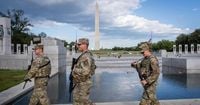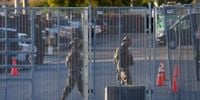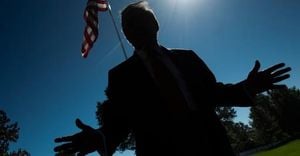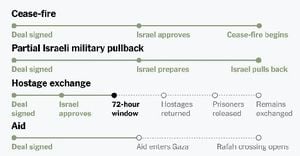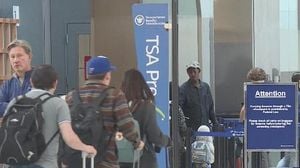In a dramatic turn of events that has ignited heated debate across the nation, a federal judge in Illinois has blocked President Donald Trump’s controversial plan to deploy National Guard troops to Chicago, at least for the next two weeks. The temporary restraining order, issued on October 9, 2025, comes amid a broader political and legal battle over the president’s repeated use of military force in American cities—a move his administration argues is necessary to protect federal property and enforce immigration laws, but which critics say oversteps constitutional bounds and threatens civil liberties.
According to The Associated Press and the U.S. Attorney’s Office for the Northern District of Illinois, U.S. District Judge April Perry found no substantial evidence of a “danger of rebellion” in Illinois, despite the Trump administration’s claims of rampant crime and unrest. In her ruling, Judge Perry cited violations of both the 10th Amendment, which reserves certain powers to the states, and the 14th Amendment, which assures due process and equal protection under the law. She wrote, “I have seen no credible evidence that there is a danger of a rebellion in the state of Illinois,” adding that the deployment of troops would “only add fuel to the fire.”
The order is set to expire on October 23, at 11:59 p.m., with a hearing scheduled for October 22 to determine whether it should be extended for another 14 days. In the meantime, the Trump administration has appealed the ruling, setting the stage for a protracted legal standoff that could have far-reaching implications for the balance of power between the federal government and the states.
Roughly 500 National Guard members from Texas and Illinois had been stationed primarily at a U.S. Army Reserve Center in Elwood, southwest of Chicago, with a smaller contingent positioned outside a U.S. Immigration and Customs Enforcement (ICE) building in Broadview. This ICE facility has been the site of frequent—and at times tense—protests over federal immigration enforcement. As of early October, National Guard personnel were visible outside the Broadview facility, reflecting the heightened tensions in the area.
U.S. Northern Command, which oversees the deployment, declined to comment on the ongoing litigation, referring questions to the Department of Defense. The Pentagon, in turn, maintained its policy of not commenting on active court cases. The troops had been activated for a 60-day period, but with the legal situation in flux, their immediate future remains uncertain.
Illinois Governor JB Pritzker, a Democrat, welcomed the court’s decision, stating, “The court confirmed what we all know: There is no credible evidence of a rebellion in the state of Illinois. And no place for the National Guard in the streets of American cities like Chicago.” City officials echoed this sentiment, arguing that the deployments were both unnecessary and illegal, and warning that a military presence could escalate tensions rather than calm them.
The battle over Chicago is just one front in a much larger conflict. Since June 2025, President Trump has repeatedly sent National Guard troops to major U.S. cities—including Los Angeles, Washington D.C., Memphis, and Portland, Oregon—often over the objections of local and state leaders. The stated aim has been to protect federal buildings and personnel amid ongoing protests against the administration’s immigration enforcement tactics and to address what Trump describes as out-of-control crime. However, crime statistics in some cities have not always supported the administration’s claims.
According to The New York Times, these deployments mark a sharp departure from the traditional role of the National Guard, which has historically focused on disaster relief and humanitarian assistance. The use of troops for domestic law enforcement has prompted a wave of lawsuits across the country, with plaintiffs accusing the Trump administration of exceeding its legal authority and violating both the Posse Comitatus Act and the Constitution.
In California, for example, nearly 5,000 troops were sent to the Los Angeles area in June to quell protests over immigration raids. Governor Gavin Newsom sued, calling the move an “unprecedented usurpation of state authority and resources.” On September 2, Judge Charles R. Breyer ruled that the deployment was illegal under the Posse Comitatus Act, an 1878 law that restricts the use of federal troops for domestic policing. The ruling barred federal troops from engaging in a wide range of law enforcement activities, from arrests to riot control. The Trump administration has appealed, and while most troops have since been withdrawn, the legal battle continues.
In Portland, Oregon, the administration’s attempt to mobilize 200 Oregon National Guard members was similarly blocked by a federal judge. Judge Karin Immergut issued a temporary restraining order on October 4, stating that the protests in Portland “were not significantly violent or disruptive in the days—or even weeks—leading up to the president’s directive.” The administration has appealed, but for now, the deployment remains on hold.
Washington D.C. has also been a flashpoint. In August, Trump invoked the Home Rule Act to take control of the city’s police and mobilize 800 National Guard troops. The city’s attorney general, Brian Schwalb, sued, arguing that the move exceeded federal authority and undermined local governance. After negotiations, a compromise was reached allowing the police chief to retain operational control, but legal challenges over the military deployment continue, with a hearing set for October 24.
Not all states have opposed the deployments. In Memphis, Tennessee, where Trump announced plans to send troops on September 12, the Republican-led state government has not filed any legal challenges. The soldiers are expected to be deployed in Memphis imminently.
Meanwhile, some Republican leaders have broken ranks with the White House. Vermont Governor Phil Scott, for example, publicly called Trump’s deployments “unconstitutional,” stating, “I think it’s unnecessary, and it further divides and threatens people. We need stability right now in this country; we don’t need more unrest.” Scott has previously declined requests to send Vermont National Guard troops to Washington D.C. or to assist with ICE enforcement, insisting that it is up to governors—not the president—to decide when to activate the Guard.
As the legal battles play out, the fate of the National Guard troops currently stationed in Chicago and other cities hangs in the balance. The upcoming hearings in federal courts will not only determine the immediate future of these deployments but could also set important precedents for the limits of presidential power and the autonomy of states in times of domestic unrest.
With the nation watching closely, the courts’ decisions in the coming weeks will shape not just the response to protests and immigration enforcement, but the very nature of federalism and civil-military relations in the United States.
